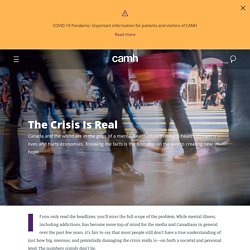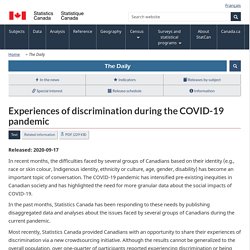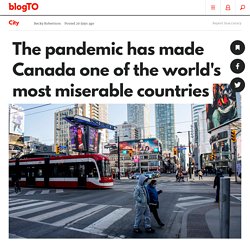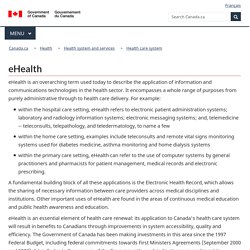

Planning for After the COVID-19 Pandemic - Canadian Global Affairs Institute. Image credit: Sergey Pesterev WikiCommons by Ross FetterlyCGAI FellowMay 2020 Table of Contents.

4 crucial health-care lessons Canada needs to learn from COVID-19. This column is an opinion by Dr.

Hance Clarke, the director of pain services at the Toronto General Hospital (TGH), and Imran Abdool, president of Blue Krystal Technologies and Business Insights. For more information about CBC's Opinion section, please see the FAQ. In the short-term we are fighting COVID-19, but eventually the dust will settle. Canada is mishandling the mental health crisis. For the past decade, Bell Canada has used the month of January to support awareness of mental health issues.

Its extensive media campaigns have encouraged Canadians to talk openly about mental health and break the uncomfortable stigma that still tends to hover over such conversations. There’s plenty of data to document the prevalence of Canada’s struggles with mental health. The Mental Health Crisis Is Real. If you only read the headlines, you'll miss the full scope of the problem.

While mental illness, including addictions, has become more top of mind for the media and Canadians in general over the past few years, it's fair to say that most people still don't have a true understanding of just how big, onerous, and potentially damaging the crisis really is—on both a societal and personal level. The numbers simply don't lie. It's a Global Problem, and We Are Not Immune According to the World Health Organization, around 450 million people currently struggle with mental illness, making it the leading cause of disability worldwide. COVID and MH Policy Paper pdf. COVID-19 mortality rates in Canada’s ethno-cultural neighbourhoods. The COVID-19 pandemic has intensified pre-existing inequities in Canadian society and has highlighted the need for disaggregated data about the ways that population groups designated as visible minorities are being disproportionately affected.

Studies in other countries like the United States have shown a significant variation in deaths attributed to COVID-19 based on neighbourhood-level social determinants of health such as age, sex, ethnicity, income and education.Note 1Note 2Note 3 However, there has been limited analysis undertaken to investigate these differences between neighbourhoods at the national level in Canada.Note 4 Population groups designated as visible minoritiesNote 5 are, for a number of reasons, at increased risk of COVID-19 infection and mortality. COVID-19 mortality rates were higher in Canadian neighbourhoods with a higher proportion of population groups designated as visible minorities Conclusion Data Source.
The Daily — Experiences of discrimination during the COVID-19 pandemic. Released: 2020-09-17 In recent months, the difficulties faced by several groups of Canadians based on their identity (e.g., race or skin colour, Indigenous identity, ethnicity or culture, age, gender, disability) has become an important topic of conversation.

The COVID-19 pandemic has intensified pre-existing inequities in Canadian society and has highlighted the need for more granular data about the social impacts of COVID-19. Macdonald-Laurier Institute. The pandemic has made Canada one of the world's most miserable countries. Given that Canada is a consistently well-ranked developed G7 country with some of the best cities in the world, you'd think that our residents would be pretty happy, all things considered.

Unfortunately, while COVID-19 and its consequences have taken a toll on both physical and mental health globally, the latter effects have hit Canadians quite hard, making the country one of the worst places in the world in which to endure the health crisis. A new "misery index" measuring how countries have handled the pandemic — and how populations have responded — has actually placed Canada quite far below countries such as New Zealand and the U.S., which we're used to comparing to or surpassing in other areas.
(And yes, in this case, ranking further down the list is a bad thing, despite the name). Canada was ranked 11 out of 15 countries assessed, "indicating a relatively poor performance in terms of reducing the misery of the pandemic," the new study from the MacDonald-Laurier Institute reads. Federal/provincial/territorial public health response plan for ongoing management of COVID-19. Table of contents Executive summary This Federal/Provincial/Territorial plan developed in collaboration with federal, provincial and territorial public health officials, Indigenous partners, and health system partners, for these and other stakeholders, provides a common forward planning approach for ongoing management of COVID-19 in Canada.

The plan acknowledges jurisdictional roles and responsibilities, identifies when national approaches are anticipated and when provincial/territorial flexibility and customization are expected. We Are All Health Care Consumers Now. In 1997, sociologist Nathan Glazer declared, "we are all multiculturalists now.

" By this he meant that the so-called "melting pot" had dissolved as a binding construct for Americans; multiculturalism had displaced assimilation. We are at a similar moment of reckoning in Canadian health care. While there remains a (small) tenacious opposition to consumerism, the force of that opposition is waning. Those who object to calling Canadian taxpayers "consumers" of health care presumably prefer the passivity signified in the anachronism, "patient. " Improving the health of all canadians a vision for the future.
Virtual Care discussionpaper v2EN. eHealth at WHO. eHealth. eHealth is an overarching term used today to describe the application of information and communications technologies in the health sector.

It encompasses a whole range of purposes from purely administrative through to health care delivery. For example: A fundamental building block of all these applications is the Electronic Health Record, which allows the sharing of necessary information between care providers across medical disciplines and institutions. It's Working For You. Canada Health Infoway. COVID19 Policy Brief Virtual Care final. Nursing Informatics New, Events & Resources - CNIA.